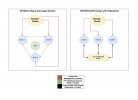After months of planning, I came to a conclusion to assemble 3 Proxmox Nodes and cluster them together.
I'm mostly interested in Mini-PC (NUC Style) with dual 2.5GbE LANs but after building 32 Core Epyc Proxmox Node, I'm known to the performance boost with actual server hardware. Anyway, I will be building 3 nodes and one thing is haunting me. Should I use ZFS with mirror disks on each node and replicate data across all other nodes to achieve HA or Install CEPH on all nodes and combine 6 M.2 NVMe drives to 1 large CEPH pool?
I've heard some amazing things on both sides and some nasty drawbacks.
I would like have some fresh opinions on this topic, especially after Proxmox VE 8.0 Release.
Some Specs that I have in mind for each nodes:
1. SP A55 512GB SSD (For Proxmox Boot Environment)
2. Intel i5 13th Gen (1340P if going with NUC or 13500 if building new altogether)
3. (IF APPLICABLE) B-Series Intel Motherboard with 2.5GbE and dual M.2 Gen-4 NVMe
4. 64GB DDR4/DDR5 RAM (as per system)
Application for Cluster (Primarily with HA in mind):
1. 2 docker servers (1 for home use, 1 for business)
2. MySQL Server for business
3. 1-2 containers for small applications like Omaha Controller, Pi-Hole, etc.
4. Jellyfin Server for small Media Collection (stored in a separate TrueNAS Scale Build)

I'm mostly interested in Mini-PC (NUC Style) with dual 2.5GbE LANs but after building 32 Core Epyc Proxmox Node, I'm known to the performance boost with actual server hardware. Anyway, I will be building 3 nodes and one thing is haunting me. Should I use ZFS with mirror disks on each node and replicate data across all other nodes to achieve HA or Install CEPH on all nodes and combine 6 M.2 NVMe drives to 1 large CEPH pool?
I've heard some amazing things on both sides and some nasty drawbacks.
I would like have some fresh opinions on this topic, especially after Proxmox VE 8.0 Release.
Some Specs that I have in mind for each nodes:
1. SP A55 512GB SSD (For Proxmox Boot Environment)
2. Intel i5 13th Gen (1340P if going with NUC or 13500 if building new altogether)
3. (IF APPLICABLE) B-Series Intel Motherboard with 2.5GbE and dual M.2 Gen-4 NVMe
4. 64GB DDR4/DDR5 RAM (as per system)
Application for Cluster (Primarily with HA in mind):
1. 2 docker servers (1 for home use, 1 for business)
2. MySQL Server for business
3. 1-2 containers for small applications like Omaha Controller, Pi-Hole, etc.
4. Jellyfin Server for small Media Collection (stored in a separate TrueNAS Scale Build)


